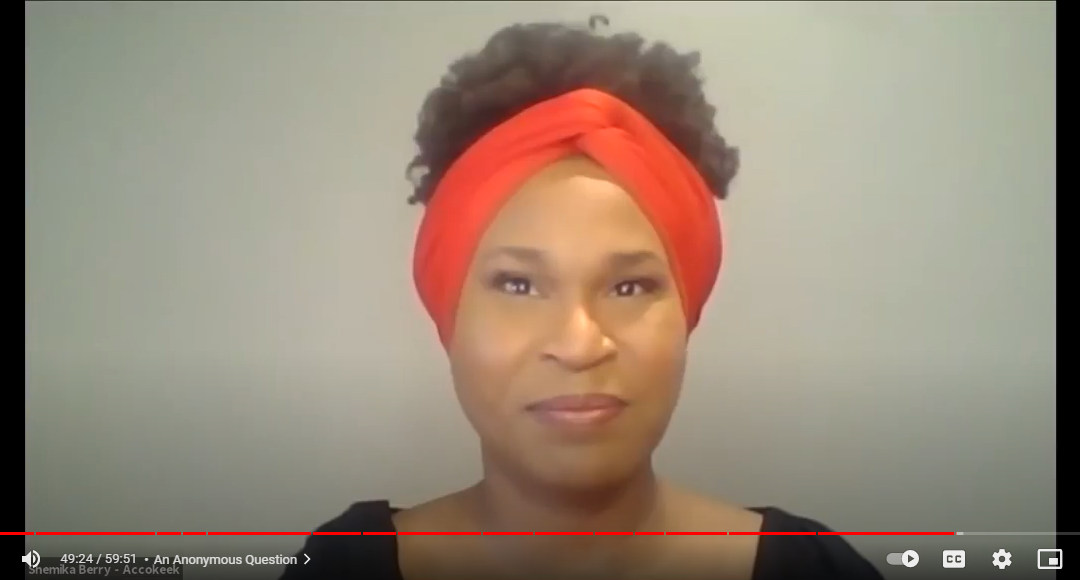The Cost of Voicing the Past: The Trauma of Historical Interpretation
February 16, 2023, Zoom webinar by Shemika Berry, First Person Interpreter at Accokeek Foundation
The above is a presentation on YouTube by Shemika Berry of the Accokeek Foundation.
I had the honor of attending this webinar by Shemika Berry, which was very thoughtfully presented and very thought-provoking. In this three-hour presentation which included videos of her first-person interpretation and a Q & A session, many facets of interpreting historical traumas were discussed. Attendees were there from over 40 US States, 4 Canadian Provinces, and 2 New Zealand cities.
She provided facts about slavery in the United States that were eye-opening. Slavery lasted from 1619 to 1865 in the U.S. (246 years). African Americans have been free in this country for less time (158 years) than they were enslaved. She spoke about descendant guilt and shame, and scenarios encountered while doing living history interpretation, including her and others’ responses. She spoke about trauma felt by historical interpreters from both sides, including slaves and their owners.
Shemika emphazized that though this is a difficult topic, we need to talk about it. “If we do not talk about the past, we are doomed to repeat it.” Directly addressing difficult parts of history in museum settings can facilitate generational healing, and educate the community authentically. It can also encourage generations to make the world better. She spoke about Museum Theater as a way to bring this teaching to children and others in the community, where sometimes topics are banned or discouraged. A good way to create a museum theater program is to first start by deciding what story you want to tell, then seeking out the staff who could best tell it.
There are several ways to support your co-workers or interpreters at your museum or historical institution. She noted that at Accokeek Foundation they have “Courageous Conversations” training, including role-playing, and she spoke about just checking in and listening to your staff to see what their needs are. The acronym “DRIVE” stands for: Discuss feelings, Reflect on the work, Inspire each other to keep going, Voice concerns and ideas, and Encourage conversations.
Shemika noted that it’s important to acknowledge head on what happened and research it well. Humanize the history by telling stories of actual people, and don’t sanitize it. When confronted with participants who ask unseemly questions, you can gently redirect them, and in some cases validate their feelings and share your perspective. While we don’t want to ostracize or embarass people, it may be necessary to correct erroneous assumptions or judgements.
In one example, she was asked to explain to a seven year old what slavery was, and why her historical character “Cate” had her son sold away. She used the analogy of a German Sheperd dog. She explained that if you have a mother dog and it has puppies, then usually you were the owner of those puppies and could decide what to do with them. People are not puppies, however, and so she would connect the dots with this young person about why this is wrong with people.
Several things in this webinar stayed with me and I learned much from it. Some statements about the Accokeek values are especially meaningful:
“We stand against injustice and systemic racism, committed to hearing the truths BIPOC’s share.”
“We forge partnerships that respect active listening and strategic actions that accentuate our partners’ strengths.”
At Singing Creek Educational Center, we are in alignment with these values and also strive to stand against injustice and racism, and forge meaningful partnerships in the community. I hope to redesign and hone our staff training program this year to address in more details these foundational values. We will be adding this webinar to our Staff Development web page, along with other resources we encounter. This endeavor is always a work in progress, as we strive to be more culturally responsive and relevant, while remaining historically accurate.


